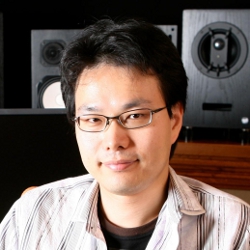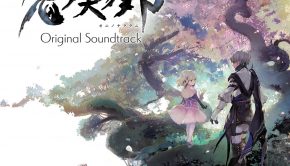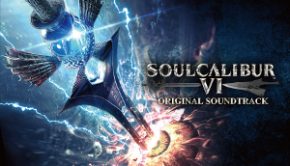Junichi Nakatsuru Profile
 |
Also Known As: 中鶴純一 (なかつるじゅんいち) |
| Date of Birth: June 6, 19XX (Japan) |
|
| Residence: Tokyo |
|
| Game Works: SoulCalibur, Ace Combat, Urban Reign |
|
| Official Site: Namco Bandai Games |
History
| Organisation | Type | Tenure | Role |
| Namco | Game Developer | 1998 – 2006 | Composer, Sound Director |
| Namco Bandai Games | Game Developer | 2006 – 2012 | Composer, Sound Director |
| Namco Bandai Studios | Game Developer | 2012 – | Composer, Sound Director |
Biography
Junichi Nakatsuru is a sound director at Namco Bandai Studios, best known for leading the soundtracks of the SoulCalibur series. Born on June 6 in Fukouka, Nakatsuru enjoyed listening to the radio and playing around with instruments during his youth. While his parents provided him with piano lessons, he always preferred playing his own arrangements of popular music over practising the expected classical repertoire. Kobayashi went on to develop these talents to adapt his favourite songs for his high school’s brass band, where he played the trombone. Going on to attend the prestigious Osaka University of Arts, he majored in art and also studied music theory, acoustics, and desktop music. He found the process of composing DTM particularly creatively liberating and decided to pursue similar work after leaving university. Applying to become an in-house composer at Namco, he impressed the company with his demo tape and started work for them in 1998.
Despite being a newcomer to the company, Junichi Nakatsuru was soon given much responsibility when he was asked to serve as the lead composer of the fighting title SoulCalibur. He developed a cutting-edge orchestral sound throughout the soundtrack to suit the period setting and action-packed gameplay. As part of the development team, Nakatsuru was able to consult the game’s planners, designers, and programmers early in the project to ensure he held a suitable creative vision for the game. He placed particular focus on the stage themes for the game, ensuring that the compositions matched the rhythm of the gameplay, the design of the stage, and the personality of the featured fighter. He also composed several thematic centrepieces on the soundtrack, including “Going to Where the Wind Blows”, for which Nakatsuru also offered a bonus piano arrangement on the well-received soundtrack release. The artist went on to adapt the soundtrack for Time Crisis 2’s console version, offering richer arrangements and implementation than the dated original.
Having proved himself with his debut effort, Nakatsuru was soon appointed sound director of the SoulCalibur series. The score for 2002’s SoulCalibur II was even more fleshed out than its predecessor. Feeling more experienced and technologically liberated, he offered more elaborate tracks than in the predecessor, including the fully-fledged orchestral anthem “Path of Destiny”. Nakatsuru states that he was particularly influenced by Star Wars scores on the project, having long-been a fan of John Williams’ work. Having shown himself to be one most adept orchestral composers at Namco, he was asked to contribute for Ace Combat 5 in 2003. After struggling for several months to find his own sound on the project, he was eventually able to reflect his own musicality and poured much emotion into the score. He simultaneously assisted the music production of Venus & Braves, adapting his signature sound for the role-playing genre. On 2005’s SoulCalibur III, Nakatsuru offered an even more rich and diverse score. Among his innovations were the use of surround sound to bring interactivity to the gameplay and recordings with session musicians to enhance the realism and drama of the music.
While working on SoulCalibur III, Nakatsuru also reflected his versatility on two lesser-known projects, Urban Reign and Critical Velocity. The former was an entirely different spin on the fighting genre, with a modern setting and raw combat; the collaborative score too largely shifted away from a symphonic emphasis in favour of hard rock and hip-hop stylings. By contrast, Nakatsuru experimented with jazz throughout the racing game Critical Velocity, offering everything from smooth jazz pieces to set the atmosphere, to hard-edged improvisations to capture the intense missions. The artist further developed a jazz fusion style with guest contributions to the original album From Dusk Till Dawn and the rhythm series Taiko Drum Master, between writing the beautiful ending themes for Ridge Racers and Ridge Racer 6. Nakatsuru further defied convention on Tekken 5 and Tekken: Dark Resurrection, offering contemporary twists on his symphonic stylings.
Nakatsuru was asked to return as part of a four-composer team on Ace Combat Zero and Ace Combat 6. While he largely maintained the emotional orchestral sound of the series, he integrated some unique elements to uniquely define each score – helming many of the flamenco experiments on the former and writing electro-orchestral fusions in a smaller role on the latter. Still spending the majority of his time on the SoulCalibur franchise, the artist returned as the sound director and lead composer of SoulCalibur IV. The concept of the score was to create the ambience and dynamic of a ‘final battle’. To achieve this, he decided to hire the Eminence Symphony Orchestra to perform a range of orchestrations on the title, feeling that only a full orchestra could offer the maximum level of expression and quality in a game score.Following this release, Nakatsuru supervised a symphonic commemoration of the series by Eminence and enthusiastically attended its premiere at A Night in Fantasia 2009.
Nakatsuru also served as the sound director of two spinoff titles, the SoulCalibur: Legends and the SoulCalibur: Broken Destiny. In both cases, Nakatsuru ensured the music and sound alike stayed true to the overall concept and musical foundations that helped define the series. While the music for the Wii title was outsourced to Basiscape, he offered several new compositions and arrangements for the PSP title, while ensuring the series’ high fidelity sound was maintained on the system. He also returned as the sound director of SoulCalibur V, aiming to renovate the series’ music from the bottom up. The artist outsourced most of the composition and recording of the score to Eminence’s Creative Intelligence Arts, but nevertheless created the main menu themes to ensure continuity within the spectacularly diverse score. The artist has also continued to develop his contemporary stylings, having made a guest contribution to Tekken 6 and a special remix for the Xevious 30th Anniversary Tribute. It is expected that Nakatsuru will continue to be involved in the SoulCalibur series and other Namco productions for years to come.
References:
– Various Game & Album Credits
– VGMdb Discography
– Interview with Dolby Sound (English, October 2005)
– Interview with IGN (English, August 2008)
– Interview with Game Music Online (English, February 2012)
© Biography by Chris Greening (September 2010). Last updated on December 30, 2012. Do not republish without formal permission.
Posted on December 30, 2012 by Chris Greening. Last modified on March 21, 2014.














